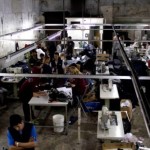
The Political Invention of the Feminist Strike
If, at the beginning of the pandemic we asked if we were facing a restructuring of class relations within the domestic sphere, that attempted to make households into a laboratory for capital, today we have many more elements to map that dispute. Exercising the feminist strike again, here and across the world, enables us to carry out a confrontation on that plane.
 Viewpoint Magazine
Viewpoint Magazine







